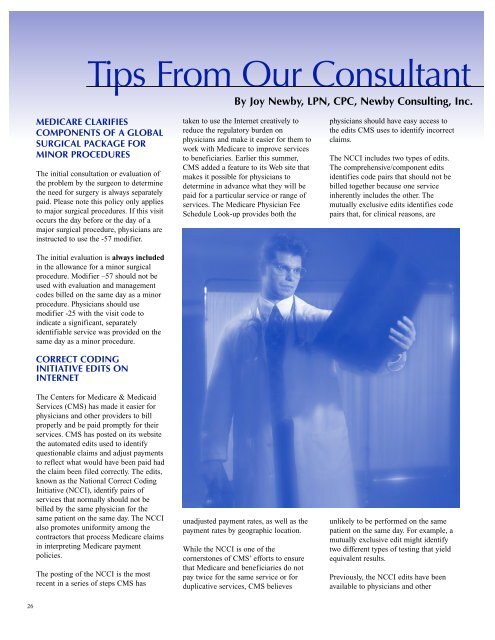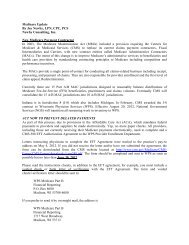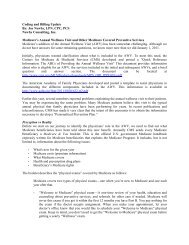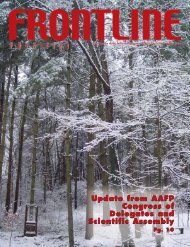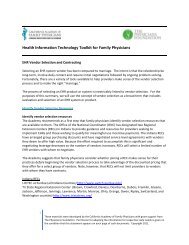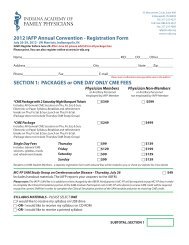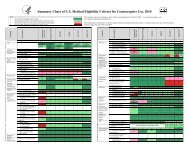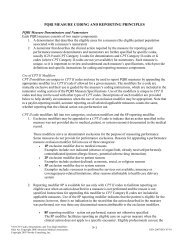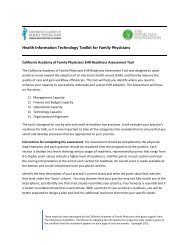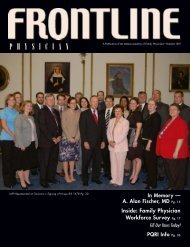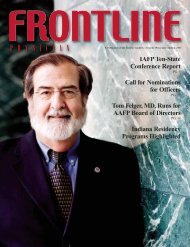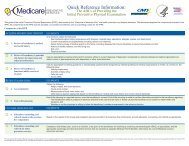Spring - Indiana Academy of Family Physicians
Spring - Indiana Academy of Family Physicians
Spring - Indiana Academy of Family Physicians
You also want an ePaper? Increase the reach of your titles
YUMPU automatically turns print PDFs into web optimized ePapers that Google loves.
Tips From Our Consultant<br />
By Joy Newby, LPN, CPC, Newby Consulting, Inc.<br />
MEDICARE CLARIFIES<br />
COMPONENTS OF A GLOBAL<br />
SURGICAL PACKAGE FOR<br />
MINOR PROCEDURES<br />
The initial consultation or evaluation <strong>of</strong><br />
the problem by the surgeon to determine<br />
the need for surgery is always separately<br />
paid. Please note this policy only applies<br />
to major surgical procedures. If this visit<br />
occurs the day before or the day <strong>of</strong> a<br />
major surgical procedure, physicians are<br />
instructed to use the -57 modifier.<br />
The initial evaluation is always included<br />
in the allowance for a minor surgical<br />
procedure. Modifier –57 should not be<br />
used with evaluation and management<br />
codes billed on the same day as a minor<br />
procedure. <strong>Physicians</strong> should use<br />
modifier -25 with the visit code to<br />
indicate a significant, separately<br />
identifiable service was provided on the<br />
same day as a minor procedure.<br />
CORRECT CODING<br />
INITIATIVE EDITS ON<br />
INTERNET<br />
The Centers for Medicare & Medicaid<br />
Services (CMS) has made it easier for<br />
physicians and other providers to bill<br />
properly and be paid promptly for their<br />
services. CMS has posted on its website<br />
the automated edits used to identify<br />
questionable claims and adjust payments<br />
to reflect what would have been paid had<br />
the claim been filed correctly. The edits,<br />
known as the National Correct Coding<br />
Initiative (NCCI), identify pairs <strong>of</strong><br />
services that normally should not be<br />
billed by the same physician for the<br />
same patient on the same day. The NCCI<br />
also promotes uniformity among the<br />
contractors that process Medicare claims<br />
in interpreting Medicare payment<br />
policies.<br />
The posting <strong>of</strong> the NCCI is the most<br />
recent in a series <strong>of</strong> steps CMS has<br />
taken to use the Internet creatively to<br />
reduce the regulatory burden on<br />
physicians and make it easier for them to<br />
work with Medicare to improve services<br />
to beneficiaries. Earlier this summer,<br />
CMS added a feature to its Web site that<br />
makes it possible for physicians to<br />
determine in advance what they will be<br />
paid for a particular service or range <strong>of</strong><br />
services. The Medicare Physician Fee<br />
Schedule Look-up provides both the<br />
unadjusted payment rates, as well as the<br />
payment rates by geographic location.<br />
While the NCCI is one <strong>of</strong> the<br />
cornerstones <strong>of</strong> CMS’ efforts to ensure<br />
that Medicare and beneficiaries do not<br />
pay twice for the same service or for<br />
duplicative services, CMS believes<br />
physicians should have easy access to<br />
the edits CMS uses to identify incorrect<br />
claims.<br />
The NCCI includes two types <strong>of</strong> edits.<br />
The comprehensive/component edits<br />
identifies code pairs that should not be<br />
billed together because one service<br />
inherently includes the other. The<br />
mutually exclusive edits identifies code<br />
pairs that, for clinical reasons, are<br />
unlikely to be performed on the same<br />
patient on the same day. For example, a<br />
mutually exclusive edit might identify<br />
two different types <strong>of</strong> testing that yield<br />
equivalent results.<br />
Previously, the NCCI edits have been<br />
available to physicians and other<br />
26


